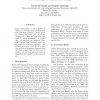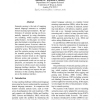5 search results - page 1 / 1 » Reranking and Self-Training for Parser Adaptation |
ACL
2006
13 years 6 months ago
2006
Statistical parsers trained and tested on the Penn Wall Street Journal (WSJ) treebank have shown vast improvements over the last 10 years. Much of this improvement, however, is ba...
COLING
2008
13 years 6 months ago
2008
Self-training has been shown capable of improving on state-of-the-art parser performance (McClosky et al., 2006) despite the conventional wisdom on the matter and several studies ...
ACL
2008
13 years 6 months ago
2008
Parser self-training is the technique of taking an existing parser, parsing extra data and then creating a second parser by treating the extra data as further training data. Here ...
EMNLP
2009
13 years 2 months ago
2009
We investigate the effectiveness of selftraining PCFG grammars with latent annotations (PCFG-LA) for parsing languages with different amounts of labeled training data. Compared to...
ACL
2006
13 years 6 months ago
2006
Semantic parsing is the task of mapping natural language sentences to complete formal meaning representations. The performance of semantic parsing can be potentially improved by u...


